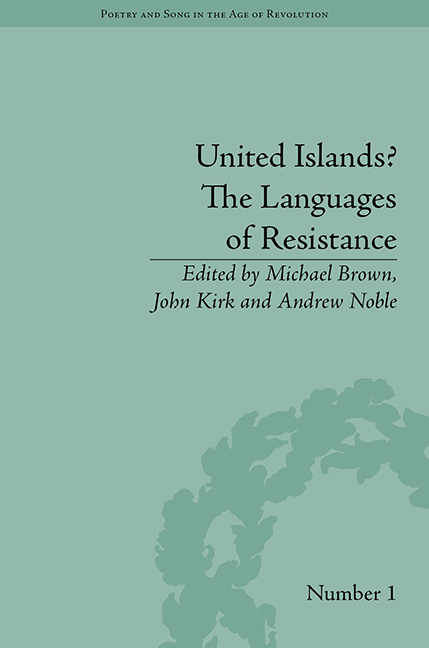Book contents
- Frontmatter
- CONTENTS
- Acknowledgements
- List of Figures and Tables
- List of Contributors
- Introduction: The Languages of Resistance: National Particularities, Universal Aspirations
- 1 Reading the English Political Songs of the 1790s
- 2 Why should the Landlords have the Best Songs? Thomas Spence and the Subversion of Popular Song
- 3 ‘Bard of Liberty’: Iolo Morganwg, Wales and Radical Song
- 4 Canonicity and Radical Evangelicalism: The Case of Thomas Kelly
- 5 Charlotte Brooke's Reliques of Irish Poetry: Eighteenth-Century ‘Irish Song’ and the Politics of Remediation
- 6 Homology, Analogy and the Perception of Irish Radicalism
- 7 Lost Manuscripts and Reactionary Rustling: Was there a Radical Scottish Gaelic Poetry between 1770 and 1820?
- 8 Virile Vernaculars: Radical Sexuality as Social Subversion in Irish Chapbook Verse, 1780–1820
- 9 Thomas Moore and the Problem of Colonial Masculinity in Irish Romanticism
- 10 Radical Politics and Dialect in the British Archipelago
- 11 ‘Theaw Kon Ekspect No Mooar Eawt ov a Pig thin a Grunt’: Searching for the Radical Dialect Voice in Industrial Lancashire and the West Riding, 1798–1819
- Afterword: The Languages of Resistance
- Notes
- Works Cited
- Index
10 - Radical Politics and Dialect in the British Archipelago
- Frontmatter
- CONTENTS
- Acknowledgements
- List of Figures and Tables
- List of Contributors
- Introduction: The Languages of Resistance: National Particularities, Universal Aspirations
- 1 Reading the English Political Songs of the 1790s
- 2 Why should the Landlords have the Best Songs? Thomas Spence and the Subversion of Popular Song
- 3 ‘Bard of Liberty’: Iolo Morganwg, Wales and Radical Song
- 4 Canonicity and Radical Evangelicalism: The Case of Thomas Kelly
- 5 Charlotte Brooke's Reliques of Irish Poetry: Eighteenth-Century ‘Irish Song’ and the Politics of Remediation
- 6 Homology, Analogy and the Perception of Irish Radicalism
- 7 Lost Manuscripts and Reactionary Rustling: Was there a Radical Scottish Gaelic Poetry between 1770 and 1820?
- 8 Virile Vernaculars: Radical Sexuality as Social Subversion in Irish Chapbook Verse, 1780–1820
- 9 Thomas Moore and the Problem of Colonial Masculinity in Irish Romanticism
- 10 Radical Politics and Dialect in the British Archipelago
- 11 ‘Theaw Kon Ekspect No Mooar Eawt ov a Pig thin a Grunt’: Searching for the Radical Dialect Voice in Industrial Lancashire and the West Riding, 1798–1819
- Afterword: The Languages of Resistance
- Notes
- Works Cited
- Index
Summary
It has long been established that many writers in the Romantic period were concerned with revising and refreshing traditional literary language. Furthermore, scholars of the literature of the period have often posited connections between changing linguistic choices and the dynamic political and historical context. This is particularly true of those writers traditionally configured as ‘Romantic’. Richard Marggraf Turley succinctly summarizes these ideas when he writes that ‘Romantics believed that reforming literary idiom was the first step towards achieving political reform’. This manifested itself in an antipathy towards neo-classical diction and syntax; an idea which was articulated in William Wordsworth's preface to Lyrical Ballads (1800). This strand of Romanticism has traditionally been thought of as rejecting elitist literary forms and contrived neo-classical diction in favour of a more accessible and democratic aesthetic.
The emerging visibility of the Irish, Scottish and Welsh contributions to Romanticism in recent years has clear implications for the study of literary language in the period. The ongoing process by which Romanticism is being configured as an archipelagic phenomenon is the latest in a series of challenges that have systematically ‘de-centred’ traditional constructions of the period. Constructions of the Romantic canon as five or six male English poets have unravelled. The increased scholarly visibility of Irish and Scottish studies and a developing archipelagic consciousness across various academic disciplines have ensured that Romanticism in the British Isles has been reconstructed as a diverse movement with distinct, but interconnected strands in England, Scotland, Ireland and Wales. Significant scholarly studies such as those by Katie Trumpener, Murray Pittock and Fiona Stafford, among others, have established Scotland and Ireland as influential sites of Romantic production.
- Type
- Chapter
- Information
- United Islands?The Languages of Resistance, pp. 167 - 180Publisher: Pickering & ChattoFirst published in: 2014



